Fish Lamps by Frank Gehry
Architect Frank Gehry has presented a new collection of his glowing Fish Lamps made of jagged plastic scales.
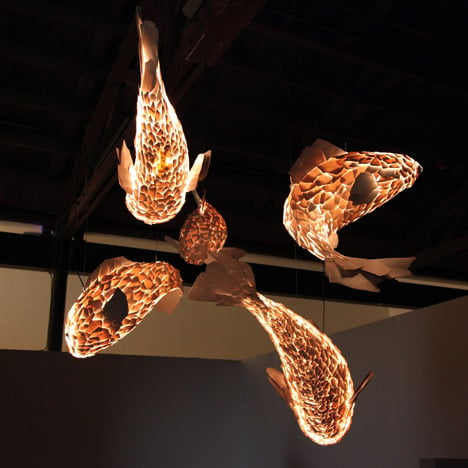
Frank Gehry first produced his Fish Lamps between 1984 and 1986 using the then-new plastic laminate ColorCore.
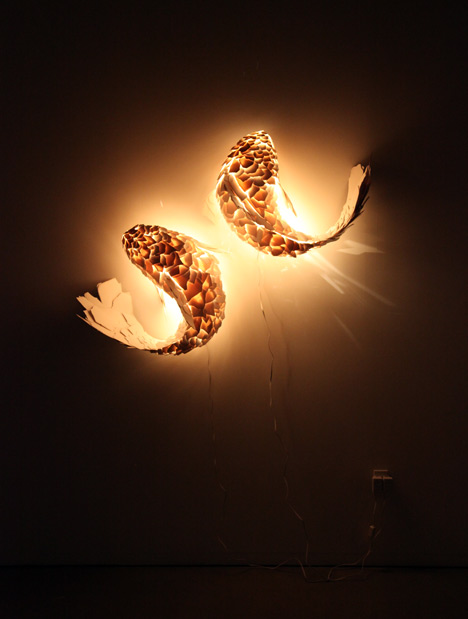
After accidentally shattering a piece of ColorCore while working on a commission for Formica, he decided to use the broken shards as fish scales by glueing them onto wire armatures.
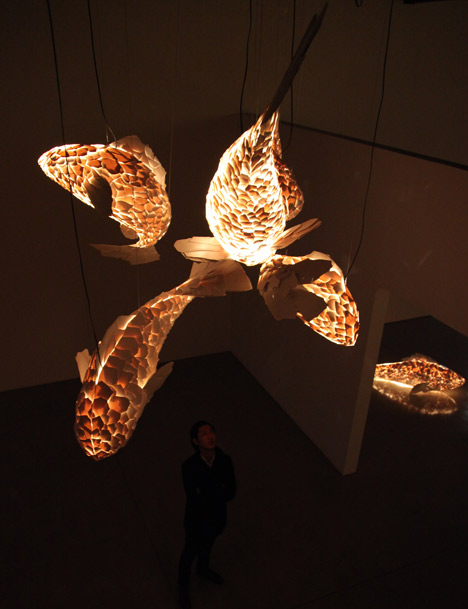
For this new group of Fish Lamps, he used larger and more jagged shards of ColorCore. Some of the lamps can be fixed vertically against a wall or pole, while others are placed on flat surfaces.
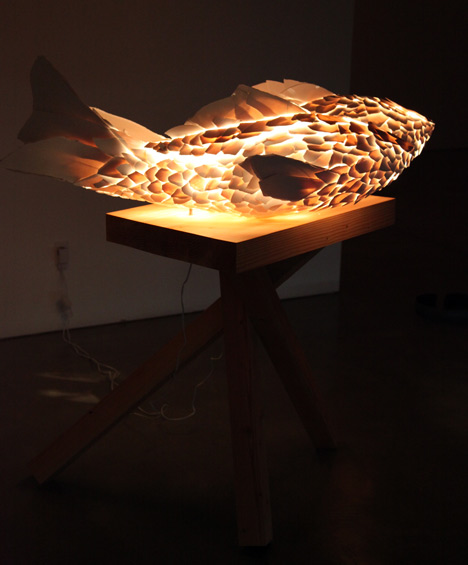
The lamps are being presented at Gagosian Beverly Hills until 14 February and at Gagosian Paris from 24 January until 9 March.
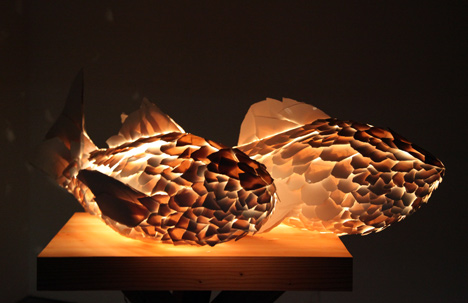
We've featured lots of architecture by Gehry, most recently a proposal for an art gallery and university complex in Toronto – see all our stories about architecture by Frank Gehry.
See all our stories about lamp design »
See all our stories about design involving fish »
Photographs are by Josh White, courtesy of Gagosian Gallery.
Here's some more information from the Gagosian Gallery:
Frank Gehry: Fish Lamps
Gagosian Beverly Hills: January 11–February 14, 2013
Opening Reception: Friday, January 11, 6–8pm
Gagosian Paris: January 24–March 9, 2013
Opening Reception: Wednesday, January 23, 6–8pm
"The fish is a perfect form." – Frank Gehry
Gagosian Gallery is pleased to present Frank Gehry's Fish Lamps. The exhibition will be presented concurrently in Los Angeles and in Paris. One of the most celebrated architects living today, Gehry's career spans five decades and three continents. Known for his imaginative designs and creative use of materials, he has forever altered the urban landscape with spectacular buildings that are conceived as dynamic structures rather than static vessels.
Gehry has always experimented with sculpture and furniture in addition to his architectural pursuits, coaxing inventive forms out of unexpected materials, from the Easy Edges (1969-73) and Experimental Edges (1979-82) — chairs and tables carved from blocks of industrial corrugated cardboard — to the Knoll furniture series (1989-92), fashioned from bentwood. The Fish Lamps evolved from a 1983 commission by the Formica Corporation to create objects from the then-new plastic laminate ColorCore. After accidentally shattering a piece of it while working, he was inspired by the shards, which reminded him of fish scales. The first Fish Lamps, which were fabricated between 1984 and 1986, employed wire armatures molded into fish shapes, onto which shards of ColorCore are individually glued, creating clear allusions to the morphic attributes of real fish.
Since the creation of the first lamp in 1984, the fish has become a recurrent motif in Gehry's work, as much for its "good design" as its iconographical and natural attributes. Its quicksilver appeal informs the undulating, curvilinear forms of the Guggenheim Museum in Bilbao, Spain (1997); the Jay Pritzker Pavilion in Chicago (2004); and the Marqués de Riscal Vineyard Hotel in Elciego, Spain (2006) as well as the Fish Sculpture at Vila Olímpica in Barcelona (1989-92) and Standing Glass Fish for the Minneapolis Sculpture Garden (1986).
In 2012 Gehry decided to revisit his earlier ideas, and began working on an entirely new group of Fish Lamps. The resulting works, which will be divided between Gagosians Los Angeles and Paris, range in scale from life-size to out-size, and the use of ColorCore is bolder, incorporating larger and more jagged elements. In Los Angeles, Gehry is also designing the installation for the Fish Lamps, following his inspired design for the Ken Price exhibition at LACMA earlier this year.
The softly glowing Fish Lamps are full of whimsy. As individuals or groupings of two and three, some are fixed to poles or wall sconces, while others can be placed on any existing horizontal surface. Curling and flexing in attitudes of simulated motion, these artificial creatures emit a warm, incandescent light. This intimation of life, underscored by the almost organic textures of the nuanced surfaces, presents a spirited symbiosis of material, form, and function.
Frank Gehry was born in Toronto in 1929. He studied architecture at the University of Southern California and urban planning at the Harvard Graduate School of Design. His drawings, models, designs, and sculpture have been exhibited in major museums throughout the world. Among his most celebrated buildings are the Vitra Design Museum, Weil am Rhein, Germany (1989); the Guggenheim Museum, Bilbao, Spain, (1997); and the Walt Disney Concert Hall, Los Angeles (2003). Awards include the Pritzker Architecture Prize (1989); the Wolf Foundation Prize in Arts (1992); the Praemium Imperiale in Architecture from Japan Art Association (1992); the Dorothy and Lillian Gish Prize (1994); the National Medal of Arts (1998); the Gold Medal from the American Institute of Architects (1999); the Gold Medal from the Royal Institute of British Architects (2000); and the Lifetime Achievement Award from Americans for the Arts (2000). "Frank Gehry, Architect," the most comprehensive exhibition of his work to date, was presented at the Solomon R. Guggenheim Museum in New York in 2001. Gehry's latest building, the Louis Vuitton Foundation for Creation in the Bois du Boulogne, Paris, will be completed in 2013.
The first Fish Lamps were shown in "Frank Gehry: Unique Lamps" in 1984 at the former Robertson Boulevard location of Gagosian Los Angeles.
Gehry lives and works in Los Angeles.